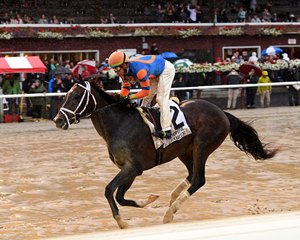What's Going On Here: Sport Needs Timely Decisions


As legal challenges have delayed a new approach to overseeing and regulating horse racing's anti-doping efforts, medication rules, and testing labs, the state-to-state approach in these areas continues to remind us of its shortcomings.
The latest blemish involves a grade 1 race, the Hopeful Stakes, and a champion 2-year-old male, Forte , and a failed drug test that wasn't reported for more than eight months after the race in question.
After winning the Hopeful Sept. 5, 2022, at Saratoga Race Course, Forte tested positive for meloxicam, a non-steroidal anti-inflammatory medication that cannot be in a horse's system on race day. The positive wasn't reported until May 11, 2023, a few days after a New York Times story broke the news of the unreported positive. Even after all that time, when it finally was reported May 11, it was a legal representative for the Forte connections who announced the positive before the regulator involved, the New York State Gaming Commission, posted the ruling.
The state-to-state regulation and oversight of horse racing's medication issues, anti-doping efforts, and testing labs has brought the sport way too many cases that drag on and on, often providing a new round of negative headlines each time a case is appealed. While it remains to be seen what occurred in this case, a standard defense playbook in recent years has included legal maneuvers that slow such cases to a crawl. In this case, delays began even before what should be an initial step—an announcement of finding by the stewards or regulatory body.
A sport can't function under such delays. Beyond the scandal of a top horse in a top race being accused of failing a post-race test, I can think of a number of problems when decisions on such cases are delayed.
Would Forte have been named champion 2-year-old male last year had voters known that he was accused of failing a post-race test after the Hopeful? While he won two more grade 1s, including the Breeders' Cup Juvenile (G1), some voters who supported him may have looked elsewhere had they known the son of Violence was accused of failing a post-race test. Instead, the process left voters in the dark.

A Forte disqualification in the Hopeful would have seen Gulfport promoted to victory, giving that son of Uncle Mo a grade 1 win. This potentially would have impacted the value of Gulfport. It would have given Uncle Mo an additional grade 1 winner and $165,000 in progeny earnings in 2022. In terms of purse money, Forte's sire, Violence, would have been on the other side of that equation.
New York Regulator Releases Timeline in Forte Case
Yes, the connections who stand to lose out should receive due process at the regulatory level—and beyond when warranted—but there also is a sport to consider here. Winners and losers need to be known in a timely manner. Not only is the state-to-state system consistently seeing long delays before resolving some of the sport's most important cases in recent years, the Forte case suggests states are now struggling just to get off the ground.
A change is needed.
The Horseracing Integrity and Safety Authority is scheduled to launch its anti-doping and medication control program May 22. In March, HISA offered a list of 10 changes that the sport can expect as it takes the reins in these areas; several involve improved efficiency in resolving cases.
- Laboratories will be accredited and their processes will be harmonized, enabling test results to come back faster in many jurisdictions. The standard turnaround time will be no more than 10 business days after receipt of the post-race tests. Faster turnaround times will enable test results to be delivered promptly so that any procedural issues can be dealt with swiftly.
- Results management and adjudication processes under the Anti-Doping and Medication Control program (ADMC) are organized specifically to avoid potential local biases and ensure swift, consistent outcomes for all racing participants. Under this system, all laboratory test results will be sent directly to the Horseracing Integrity and Welfare Unit (HIWU), which will notify individuals of failed tests and be responsible for the investigation and prosecution process.
- Adjudication decisions will be made by either the Internal Adjudication Panel, in cases of recognized medications in violation of race-day standards; or the independent Arbitral Body, which will make the call on banned substances. This will replace the previous adjudication processes of stewards, state racing commissions, and state courts. Final decisions by the IAP or Arbitral Body can be appealed to a federal Administrative Law Judge.
- When it comes to banned substances, those that are never allowed in the horse at any level, the relevant covered person will face a provisional suspension. In such cases, as the covered person is immediately suspended, they will have no motivation on their side to delay proceedings.
As HISA put it, "This measure is critical to ensuring integrity in our sport and is a departure from the processes (that) previously allowed cheaters to evade accountability by exploiting the rule discrepancies in various jurisdictions, continuing to race as they filed appeals, and avoided sanctions—including disqualifications—through lengthy litigation."
On the horsemen's side of things, HISA is in a better position than states to discount positive test findings likely resulting from environmental contamination. As HISA notes, "The ADMC program's atypical findings policy requires additional investigation in any instance in which a horse tests positive for a substance that has a higher risk of being present as a result of environmental contamination rather than intentional administration. If HIWU determines that the substance was present due to contamination, the test result may be considered negative, and no penalties will be issued."
When it comes to adjudicating such cases in the sport, it's time for HISA, without delay.
